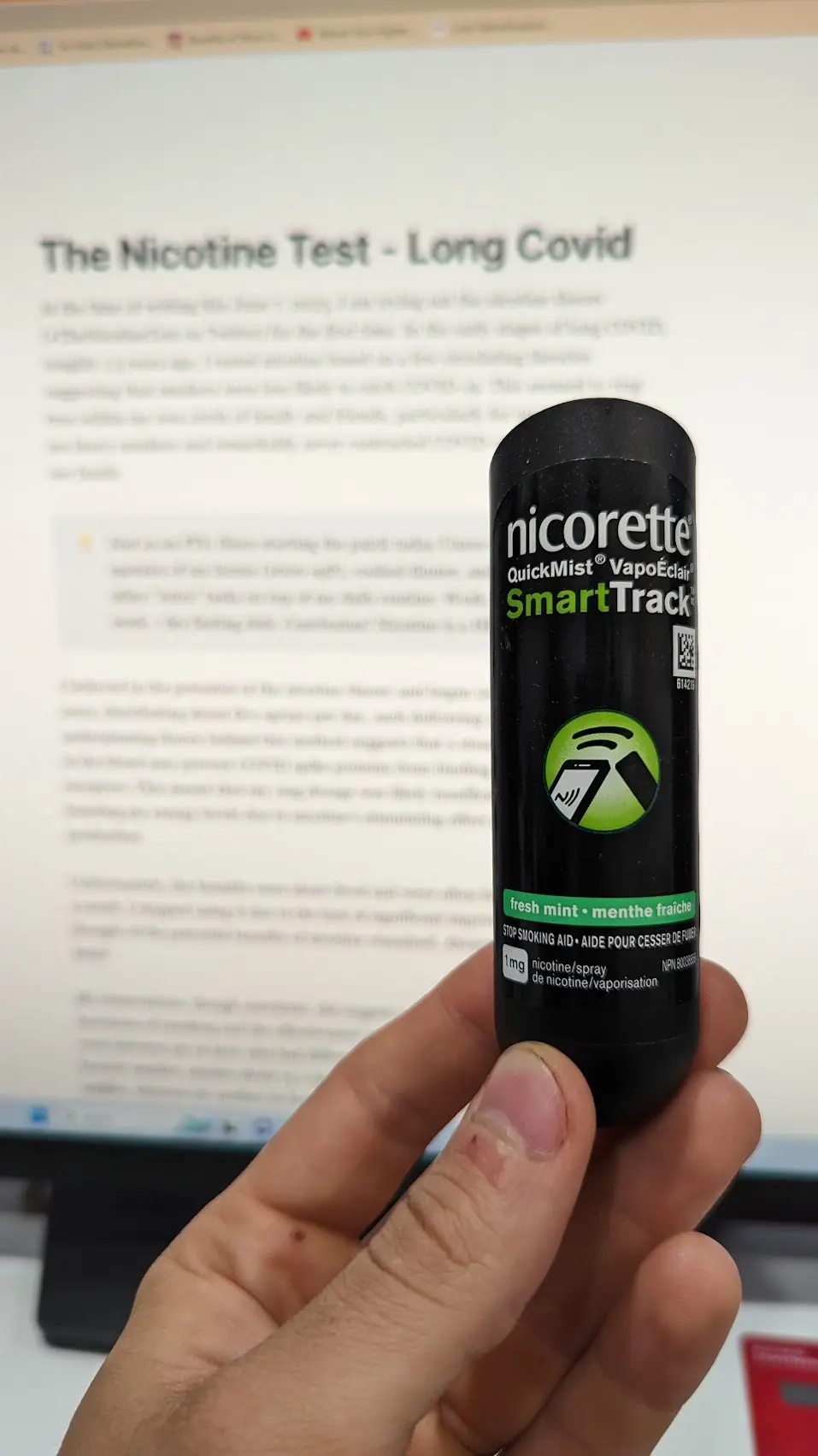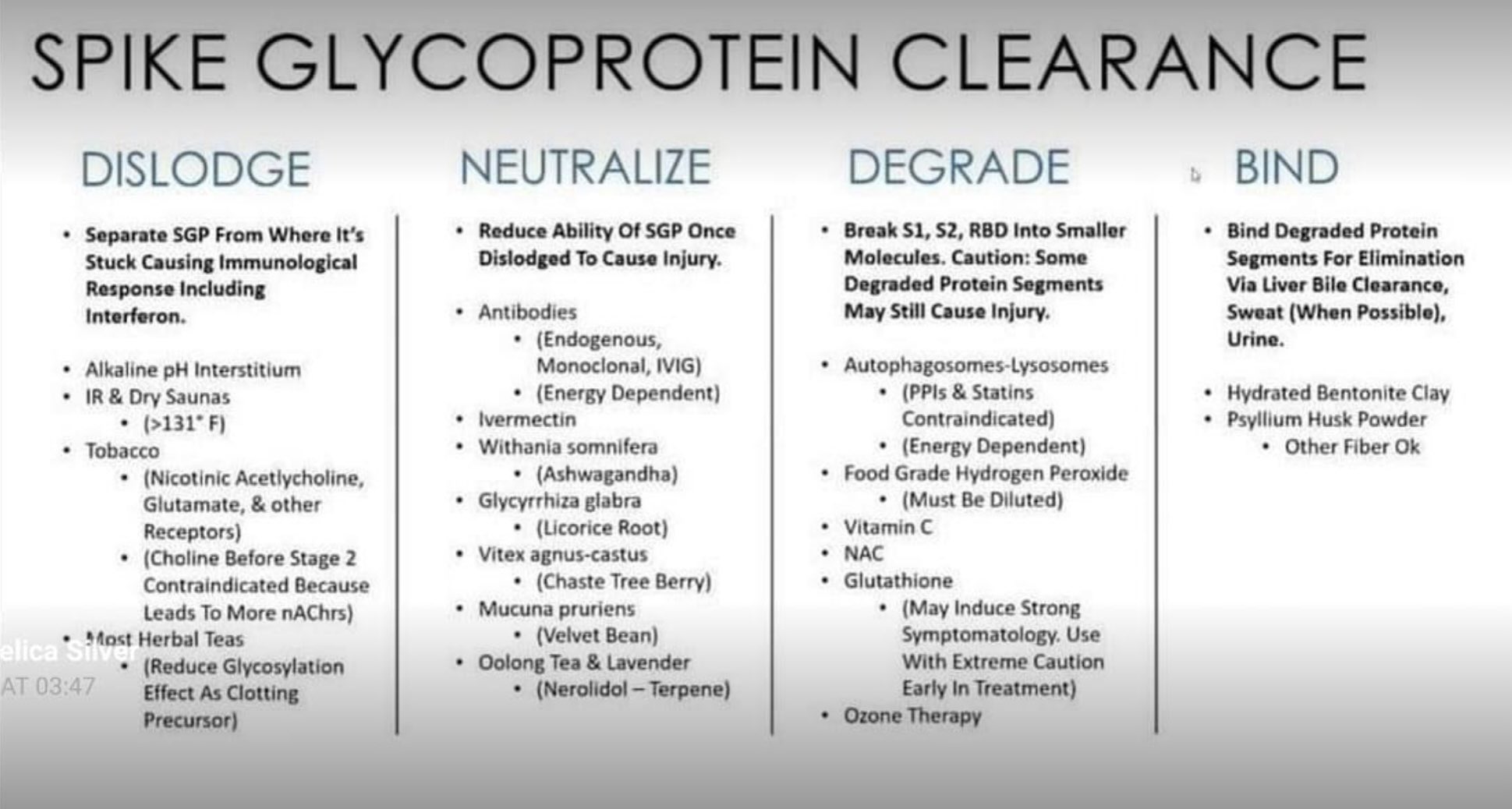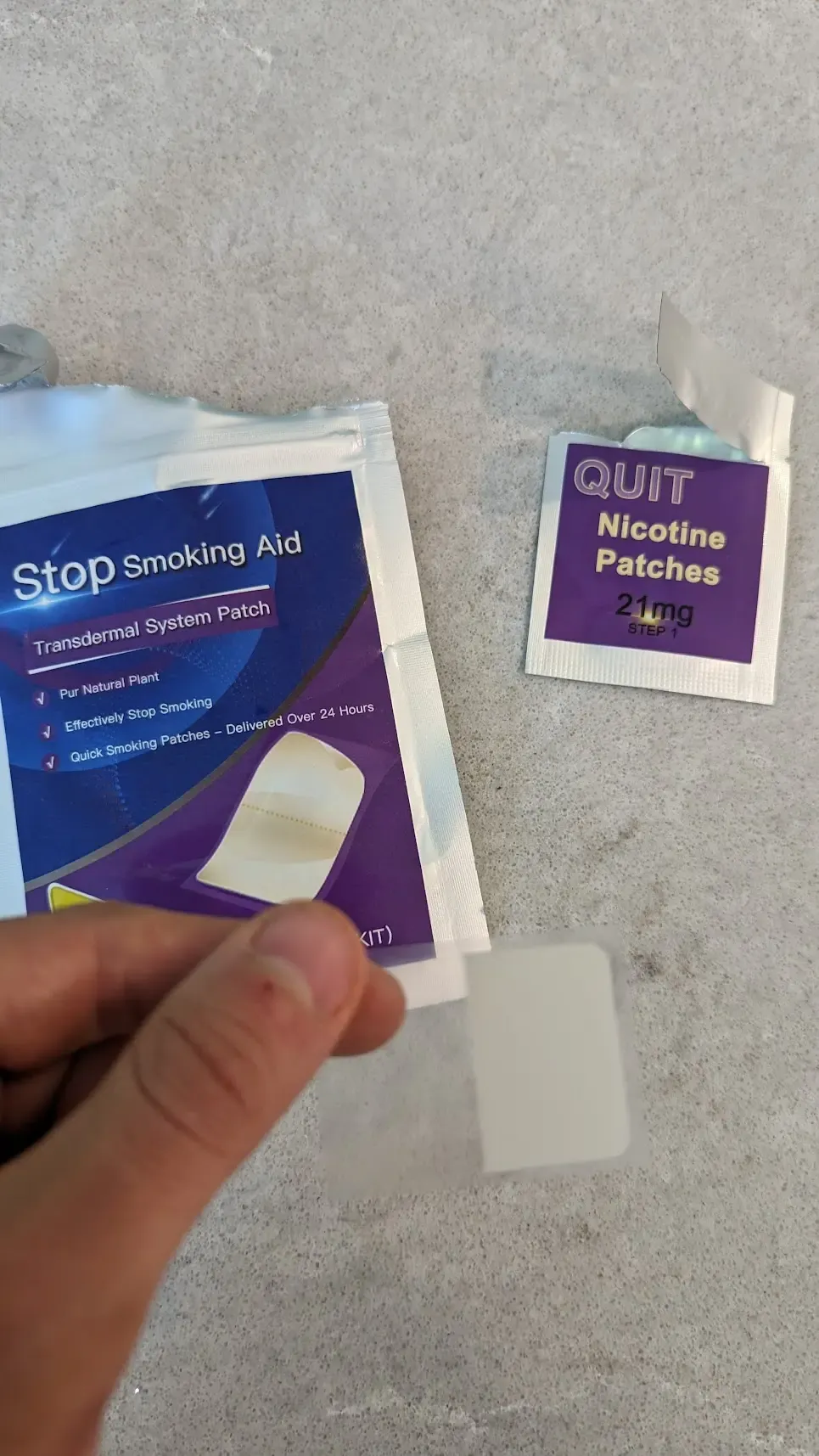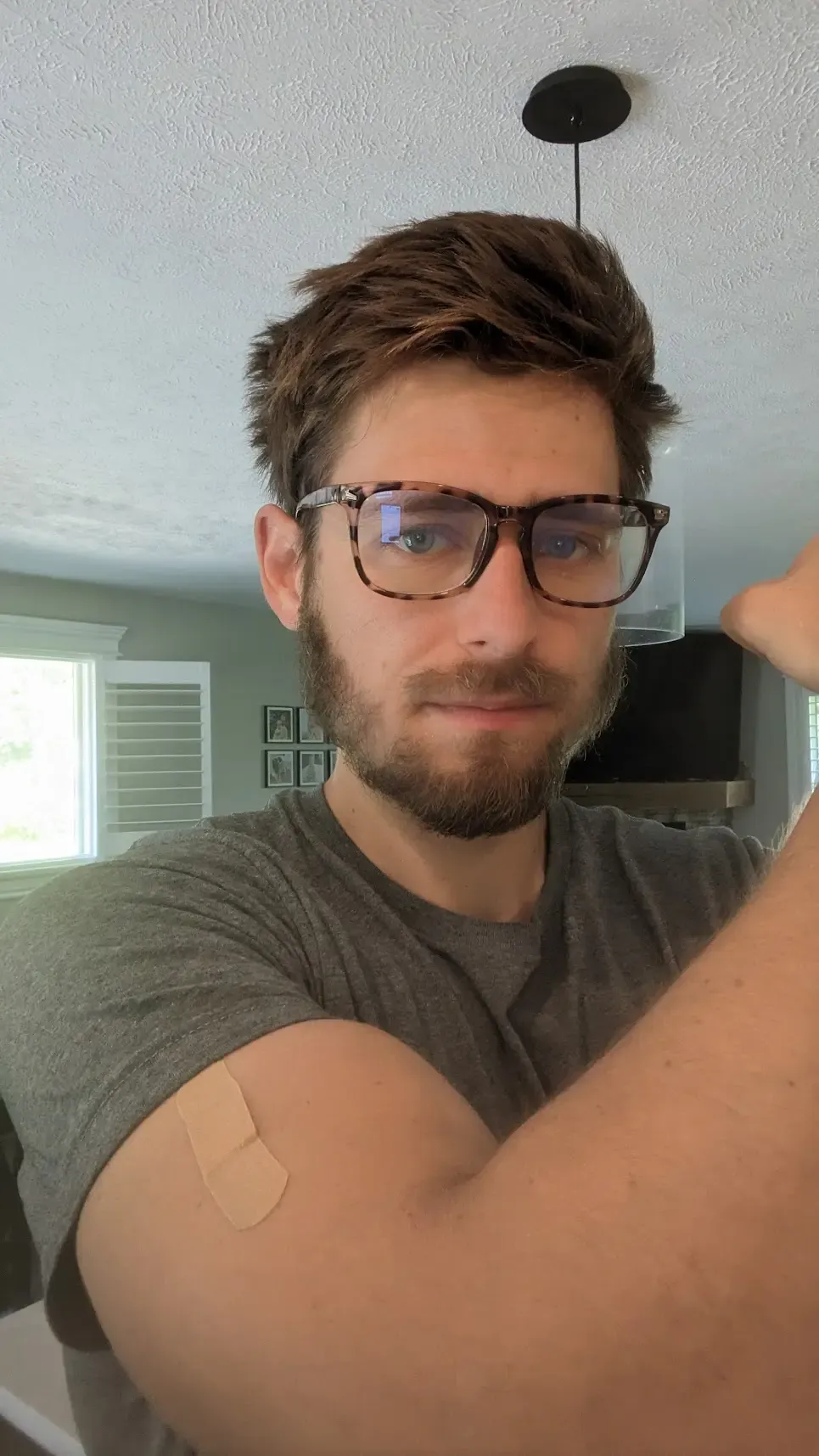Update 1: The Nicotine Test for Long Covid
At the time of writing this June 7, 2023, I am trying out the nicotine theory (#TheNicotineTest on Twitter) for the first time. Note, I am no longer a long hauler, so this minor relapse is very insignificant and my nicotine experience may vary wildly from someone still in the early stages of long covid. In the early stages, roughly 1.5 years ago, I tested nicotine based on a few circulating theories suggesting that smokers were less likely to catch COVID-19.
This seemed to ring true within my own circle of family and friends, particularly for my in-laws who are heavy smokers and remarkably never contracted COVID-19, unlike the rest of our family.
I believed in the potential of the nicotine theory and began using nicotine sprays in 2022, distributing about five sprays per day, each delivering 1mg of nicotine.
The underpinning theory behind this method suggests that a steady supply of nicotine in the blood may prevent COVID spike proteins from binding to acetylcholine receptors.
This meant that my 1mg dosage was likely insufficient despite it boosting my energy levels due to nicotine's stimulating effect on dopamine production.

Unfortunately, the benefits were short-lived and were often followed by crashes. As a result, I stopped using it due to the lack of significant improvement. But the thought of the potential benefits of nicotine remained. Always in the back of my mind.
My observations, though anecdotal, did suggest a correlation between the heaviness of smoking and the effectiveness against COVID-19. I noticed variations even between my in-laws who had different smoking habits - my father-in-law, a heavier smoker, smokes about 15 a day and never suffered anything beyond sniffles, whereas my mother-in-law who smokes about 7-8 a day experienced brief bouts of COVID-19 before quickly recovering. Think of 1-2 days of sniffles, while everyone else had the full debilitating viral experience.
Nicotine, a parasympathomimetic alkaloid found in tobacco, shows promising anti-inflammatory properties and might be helpful in treating some chronic inflammatory diseases, such as sepsis, ulcerative colitis, rheumatoid arthritis, and others.
However, its use needs careful consideration due to its complex pharmacology and potential negative effects. The anti-inflammatory effects of nicotine seem to be linked to its interactions with nicotinic acetylcholine receptors (nAChRs), particularly α7, α4β2, and α3β4 subunits, present in various non-neuronal cells.
While nicotine has potential for therapeutic use, issues around tolerance, addiction, and safety need to be taken into account. Further research is needed to understand nicotine's interaction with the inflammatory system and to develop its therapeutic use while balancing anti-inflammatory and pro-inflammatory responses.
https://www.frontiersin.org/articles/10.3389/fimmu.2022.826889/full
Currently, I am revisiting the nicotine theory. A few months ago, I bought nicotine patches because of people talking about the nicotine patch theory. But I didn't use them due to the remarkable results I was getting from dry fasting. Dry fasting truly works.
However, the idea of using nicotine was also somewhat intimidating, primarily due to our societal perspective on smoking's dangerous effects on health. But perhaps nicotine itself might not be as bad as we presume, and could potentially serve as a weapon against COVID-19. I mean I was terrified of dry fasting when I first heard about it, I literally thought it was toying with death, considering that nicotine should be a piece of cake. I mean most nightshade vegetables have high doses of nicotine, right?

I decided to go ahead with the nicotine test after seeing numerous anecdotal reports on Twitter, which created a flurry of support for the theory. Of course, the effectiveness varied among individuals, which is to be expected considering our unique physiologies. Everyone is different. But there was a prevailing trend suggesting that those with less COVID-related damage or shorter long-COVID experiences seemed to gain more noticeable benefits.

But this strategy is not without its challenges - people with severely compromised immune systems might struggle to clear the virus efficiently. This anecdotally also helps many other autoimmune issues like ME/CFS.
This is where dry fasting, or fasting in general, can be an asset. It's surprising how many people with autoimmune issues shy away from extended fasting despite numerous anecdotal and research-backed benefits. Fasting is one of the few activities that trigger potent autophagy, allowing your body to heal and rejuvenate. Stem cells, especially, can help regenerate damaged organs and the immune system, which is crucial for the nicotine theory to work.

I started with a 21mg nicotine patch, which can conveniently be torn in half for a dosage of approximately 10.5mg each. If you want a smaller dose, you can fold it to about 5.25mg. Since starting this, I've felt an increase in energy and an uplifted mood. Just to make it clearer. I am starting with the 5.25mg dose. I've also ordered some 7mg patches, to jump to that in 2 days, and then I'll transition to the 10.5mg.

In terms of my own health, I've largely recovered from long COVID, but a recent bout of heavy exercise and sauna use led to a minor relapse going from 100% to 90%, still able to exercise, but after being back to perfect health, it's a scary thing indicating that something is still amiss. On most days, I feel great, and my recent blood test results look normal. However, I aim to recover fully to the point where I can run a marathon.
I did take a blood test very recently. Though it's noted that blood tests don't definitively indicate Long COVID, many online have shared their experiences of getting blood tests and receiving results that are entirely normal, despite having a debilitating illness and chronic fatigue.
For my part, I'm content with my blood cell counts and other markers, and more importantly, I've been feeling really great on a daily basis until this mini relapse. It's important to highlight that, despite this relapse, I'm still fully functional. It's just a slight dip, but one that has, admittedly, freaked me out a little.
A part of me knew I was never 100%, but being at 98% felt like I had won. I live the same life (possibly even better) than pre-covid. The only issue was that I haven't worked out at the same intensity yet as pre-covid (it was pretty intense), but daily gym workouts and runs were completely fine.
I knew I would be doing a few more dry fasts, and I really believe that dry fasting is probably one of the only keys to true health post covid, but covid re-infection is always an issue.
I'm really excited about the nicotine theory, because if there's some truth to it, taking a nicotine patch when going on vacation may be an ace up the sleeve for everyone susceptible to LC.
I will continue to update you as I press on with this nicotine test. It's an approach that is garnering quite a following, with many swearing by its benefits. An informal experiment involving several Long COVID sufferers found that all participants experienced a relief of their symptoms and zero relapses in the follow-up period a few months later. This is absolutely astounding. Even if the underlying theory behind nicotine use is incorrect, as long as it works, we'll all be happier for it.

However, it's important to remember that if your body has suffered organ damage and other types of injury from COVID, especially if it's been a protracted condition or if you've had severe Long COVID, the damage incurred may not be reversed by nicotine. Sure, nicotine might lift some brain fog and clear receptor sites, making you feel better, but it's not going to reverse significant organ damage.
That's where fasting, particularly dry fasting, comes into the picture. If you're allergic to nicotine, apprehensive about using it, or just want to avoid it altogether, fasting might be the alternative for you.
However, if you're scared of nicotine, it's likely you'd also be wary of dry fasting. If that's the case, my recommendation would be to start slow with water fasting.
There's ample research supporting the safety and benefits of water fasting, so you needn't be fearful. Though water fasting provides nearly the same level of healing as dry fasting, it does take longer. If you're unable to allocate weeks for extended water fasting, it would be beneficial to begin learning about and preparing for dry fasting. This way, you can experience the healing power three times faster.
That's all for now. I'll keep you updated on the protocol and my own experiences. Good luck on your dry fasting journey, and feel free to check out these links for more information and shared experiences on #TheNicotineTest Twitter conversations. If you're ready for the ultimate long covid healing journey check out the Scorch Protocol for Long Covid
Update 2: The Nicotine Test for Long Covid
June 9, 2023. As I approach the 48-hour mark of my Long Covid nicotine test, I've been wearing a 5.25 mg nicotine patch which I plan to replace in about an hour with a 7 mg version. Over the next few days, I'll continue to increase the dosage, concluding the week with a 10.5 mg patch.
On the first day of wearing the patch, my energy levels were so high, I managed to clean the entire house and complete multiple tasks, despite also working and exercising. This increase in productivity and activity levels, which I estimate to be about 200%, is likely due to the dopaminergic effects of nicotine, boosting motivation and energy levels. As a known stimulant, it seemed to alleviate my relapse symptoms entirely.
About 24 hours into the test, I started experiencing what felt like sinus allergy symptoms, even though I hadn't exhibited any allergic reactions in the past week. I suspected this might be related to Mast Cell Activation Syndrome (MCAS), but I was quite certain it was some form of detoxification. Despite these symptoms, my energy levels remained high on the second day, though not as high as the first day. Still, I was able to complete all my tasks.
Interestingly, my sleep pattern was also affected. I woke up very early both nights, feeling energetic. On the first night, I noticed vivid dreams, and while I still woke up early the second night, my dreams were not as vivid. I also experienced some slight breathing difficulties due to what I suspect was a histamine reaction.
Alongside the nicotine patches, I have been taking Ivermectin as an additional measure to neutralize spike protein or other viral debris dislodged from the acetylcholine receptor sites. Ivermectin has an immunomodulatory effect, reducing inflammation and histamine, and generally making me feel much better. However, I noticed an increased histamine response 24 hours after taking Ivermectin.
To degrade any proteins dislodged and now free-floating in my bloodstream, I've also been taking glutathione. While our bodies naturally initiate a process of degradation during sleep, known as autophagy, for those with autoimmune diseases, this process may not be sufficient, necessitating a stronger approach, such as extended fasting.
However, I'm currently not fasting alongside the nicotine test, although I've considered it as a potential future experiment. Combining fasting-induced autophagy with nicotine-induced detoxification could prove interesting. Yet, there are risks to introducing additional toxins to the body during a fast, a period when the body is in a vulnerable state.
In my journey, I plan to increase the nicotine patch dosage while also using Ivermectin and glutathione. Despite the fear of nicotine addiction, it's important to note that nicotine patches are less addictive than smoking. Moreover, the detoxification process doesn't necessarily equate to a pleasurable experience, potentially reducing the risk of addiction. Furthermore, fasting is a powerful tool against addiction, making me less concerned about potential nicotine dependence
Organized thoughts on update #2 of the Nicotine Test.
I am currently undergoing a unique experiment to combat Long Covid using nicotine patches. This is part two of my ongoing journey where I've been closely monitoring my physical responses and making careful adjustments in my approach.
Methodology
The experiment started with me wearing a 5.25 mg nicotine patch for 48 hours, followed by an upgrade to a 7 mg patch for the next two to three days. I plan to round off the week with a two-day 10.5 mg patch. Concurrently, I also decided to incorporate Ivermectin and glutathione into the regimen to supplement the effects of nicotine. I'll elaborate on this more in a bit.
Initial Findings
Right from the first day of the nicotine patch, I noticed an immediate surge in my energy levels. Remarkably, I found myself tackling my daily tasks more efficiently and even increased my exercise output. I attribute this improved motivation and energy boost to nicotine's dopaminergic effects and stimulant nature. I wrote about this in the first update, when I said Nicotine is a Hell of a drug! This goes hand in hand with personal anecdotes of people with ME/CFS saying the nicotine patches allowed them to get off their couches and go outside for the first time in years. I was tapping my foot and felt like an energizer bunny that just did not want to stay seated.
Side Effects
On the flip side, I experienced some allergy-like symptoms about 24 hours into the test, which felt as though my body was undergoing a detox. I also found myself waking up earlier than usual, though not groggy and noticed an increase in the vividness of my dreams.
Let's talk about this for a second. I had awkward moments throughout the day where I was sniffling, and blowing my nose. It had aspects of allergies to it, but I still felt great and had the urge to keep moving and doing things. It is hard to explain but it truly felt like I was detoxing and the body was trying to remove viral particles or debris.
The dreams were not as vivid on the second night. Waking up I did not feel groggy at all, but I also did not feel super rested. It's weird because I still felt great, so it was not a zombie-type of feeling at all. As I said, not groggy at all, but also not fully rested. Once I got my 7 am walk in, I felt great and had a greens smoothie.
Use of Ivermectin
Ivermectin, which I took on the first day along with the nicotine patch, is known for its immunomodulatory effects. My personal experience was no different - the first 24 hours were fantastic. However, I did notice an increased histamine response the following day. This is something I've experienced multiple times.
I know Ivermectin affects different people differently, but for me it always makes me feel great for the first 24 hours and the next 24 are a slight come down where I feel elevated histamine which goes away. Just trying to tie it into the spike clearance theory, it would mean that ivermectin neutralizes the spike protein, along with its immunomodulatory effects, but once the effects wear off you've got the neutralized spike still floating in the blood.
Role of Glutathione and Autophagy
Given Ivermectin's role in neutralizing the protein, I also started taking glutathione after the first 48 hours to aid the degradation of dislodged proteins. Autophagy, induced by a fasting state or ketosis, is crucial in this context, as it helps degrade and eliminate unnecessary or dysfunctional cellular components.
So I am not fasting during this test, but to target the other 3 steps following dislodging, I need to Neutralize (ivermectin) and my own antibodies, Degrade (Glutathione) and my body's own autophagy, and Bind (activated charcoal and fiber).
Consideration of Fasting
While I haven't fasted during this nicotine experiment, it's something I'm considering for the future. I'm curious to learn how nicotine might affect the body during a fast and whether this could enhance the autophagic process.
Improving the bodies fasting capabilities my be important, which would mean make sure not to eat at least 4 hours before bed to trigger the Migrating motor complex, and deeper levels of autophagy while sleeping, eat lower-carb food, and possibly manage blood glucose levels with something like Berberine or Metformin.
Addressing Addiction Concerns
Some might worry about the addictive potential of nicotine. However, nicotine patches offer a slow-release mechanism, which blunts their addictive qualities. Moreover, I believe the detox symptoms will make sure the body doesn't associate a pleasurable experience with nicotine.
Update #3: On Third Round of Nicotine Testing

Nicotine Update #4 - September 2023
There's definitely something to nicotine. I don't believe it's a cure, but it is most definitely a relapse inhibitor on top of ivermectin. They synergistically work hand in hand. L-Lysine is also very important. It's ketogenicity, and ability to inhibit latent virus reactivation is massive. There are certain aspects of long covid that can most definitely be improved with nicotine but it takes precision. I think that nicotine can be abused, and you will go through some serious withdrawals, as well as herx style symptoms so you need to be aware. Would I put nicotine into a generic long covid healing plan? Yes, but not in the early stages. You need to see how your body reacts to dry fasting, and there have been too many testimonials where nicotine patch therapy has actually made some long haulers slide backwards. My theory here is that if you have specific damage done to certain pathways or organs, you may be contraindicated for the nicotine therapy. What this means is that you need dry fasting and correct diet to get you to a place where it becomes safer to use the nicotine patch therapy. Yes this all works together, yes it's hard, but it works and you will need to 'man up'.
I'll post some papers that I have used to get to these conclusions. A post about all the thoughts, experiments, papers, and research would be more than 10k words and I don't have the time for it right now.


I do believe that adequate nicotine in the system can prevent covid from progressing into the nervous system. I wish I had known this earlier as I believe it's a long covid preventer. You have to take into consideration dosages, timings, and refractory periods. If you do it too much you risk having too much Ace2 expression as the body tries to balance the constant high doses of nicotine. If you smartly approach this, you can set yourself up for success.

Nicotine-related research papers


This is a possible explanation of why nicotine's reduction of ER stress helps improve mitochondrial energy function:







